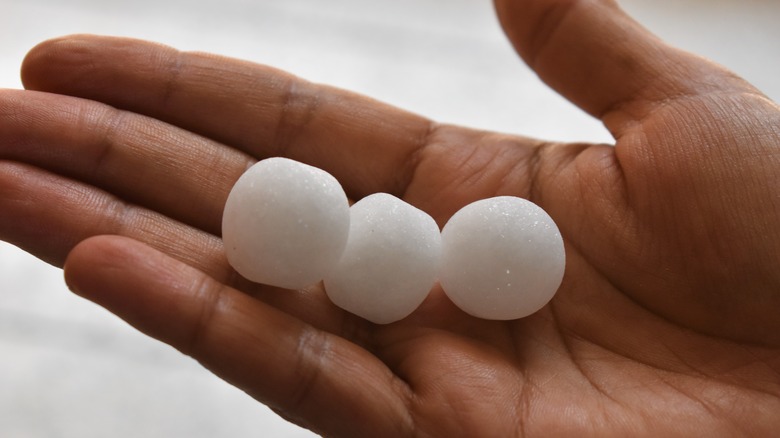Why You Should Never Use Mothballs In Your Closet
There is no mistaking the signature smell of a room that has mothballs in it. The pungent chemical odor is not only hard on the nose but could also be harmful to the members of your household. Mothballs are a type of insecticide and are typically used to deter moths, moth larvae, and silverfish from settling into and ruining your clothing, especially those items that are being stored away in a closet or kept in a musty environment. Moth larvae are attracted to clothing that is made from animals, specifically fur, wool, and silk, according to Live Science. The larvae will then actively eat these materials in order to survive, leaving nasty little holes in your favorite garments. Although using mothballs to prevent this from happening may sound extremely beneficial, mothballs contain ingredients that could prove to cause more harm than good.
Mothballs have also been known to be used as a pesticide in order to rid your backyard of rodents or snakes or even placed in the attic in order to ward off bats and even pesky squirrels. But not only are mothballs an ineffective pest repellent, but they can also actually cause some serious damage to your garden's soil and the surrounding plant life, per the National Pesticide Information Center. Also, because of the actual shape of the pellets or balls, they could be mistaken for food and may be ingested by children, pets, or other outdoor animals. This could lead to poisoning or other worse health concerns.
The reason you shouldn't use mothballs in your closet
The mothballs that we are familiar with are made from two main ingredients, naphthalene and paradichlorobenzene. These chemicals can aid in killing moths or moth larvae and keep them away from your stored clothing. However, according to Oregon State University, mothballs work by actively releasing the chemicals into the air of the surrounding environment, which means that if you can smell it, you are likely inhaling dangerous fumes. Breathing this in could lead to terrible headaches, breathing issues, and even nausea. Once that smell has been exposed to a home, it can permeate your furniture and floors, making it difficult to get rid of. Matha Stewart recommends a cleaning program that includes absorbing the chemicals with kitty litter, lots of fresh air, and active heat to speed the chemical process along, and lots of patience in order to cleanse your home of the terrible smell.
The Department of Health and Hospitals specifically says not to store mothballs in closets, drawers, or other rooms of the house unless you are using them in the properly directed manner as stated on the label of the insecticide. This means that if you have to use mothballs, they should be kept in an air-tight, sealed container and then placed where they are needed. If you plan on wearing clothing that has been exposed to mothball vapors, then you must make sure that they are fully washed, so you don't risk breathing in the chemicals.

